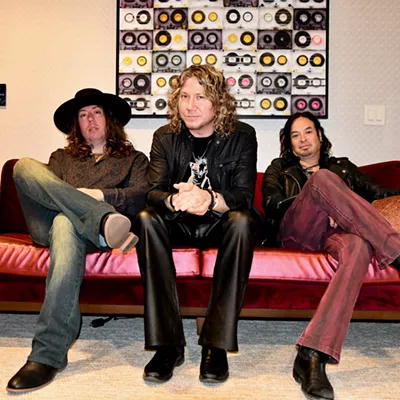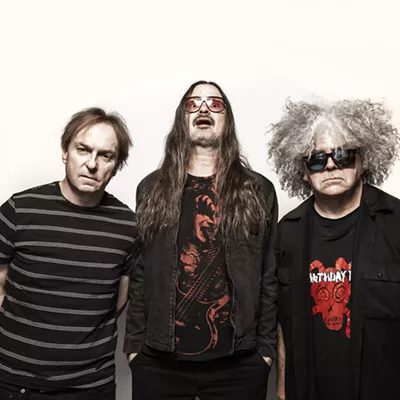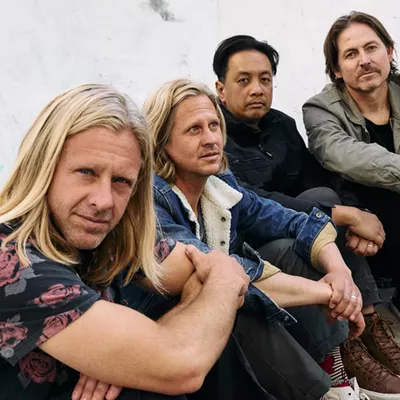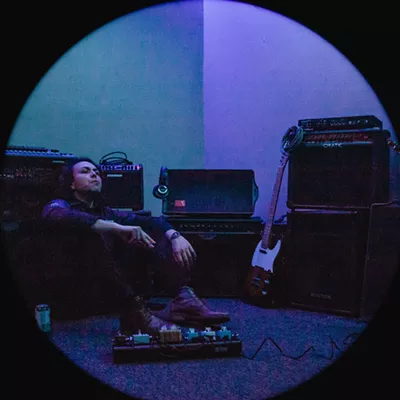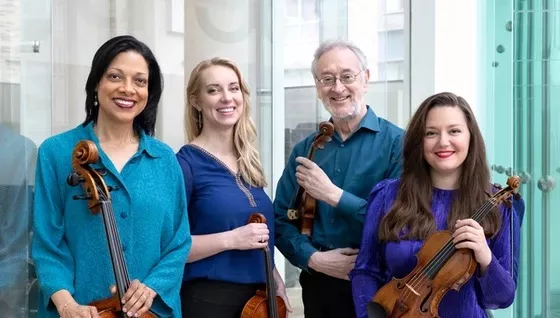
Bringing into perfect harmony a dynamic combination of the well-known and the forward thinking, the Juilliard String Quartet continues to electrify concertgoers the world over.
This do so through a shared commitment to presenting audiences with the time-honored wonders of the string quartet, through the ensemble’s rendition of classical masterpieces, while at the same time fostering curiosity by upholding the mission of championing new works by contemporary composers.
Formed in 1946, as the quartet-in-residence at the Juilliard School, its forebears’ intent was clear: “To play new works as if they were established masterpieces and established masterpieces as if they were new works.” Over the course of a storied history, the latest in a long line of descendants to assume the mantle of this esteemed institution have stayed true to the original mission statement.
After a long absence — since December 2018 when The Juilliard String Quartet last performed as part of Arizona Friends of Chamber Music’s Evening Series — the venerable quartet returns for a two-night engagement on Wednesday, Oct. 26, and Thursday, Oct. 27, at the Leo Rich Theater.
As fate would have it, the ensemble was again slated to perform in Tucson in December 2020, but to no avail. As the pandemic continued to cast an ominous pall worldwide, in place of a live performance the quartet released an online video while in lockdown, rehearsing the works of Jörg Widmann.
As COVID-19 restrictions began to loosen, the same program was rescheduled for November 2021. That concert was subsequently canceled due to the progressing illness of British violist Roger Tapping.
Tapping died of cancer in January at his home in Manhattan. He was 61.
In his lifetime, Tapping’s artistry was at the core of three prominent string quartets: The Allegri Quartet, which he joined in 1989; the Takács Quartet, which brought him to the United States in 1995; and, finally, the Juilliard Quartet, beginning in 2013.
Celebrating its 75th anniversary this season, the present incarnation consists of violinist Areta Zhulla, occupying the first chair, cellist Astrid Schween, second violinist Ronald Copes and violist Molly Carr, the most recent addition to the venerable Juilliard String Quartet, filling the void left by Tapping.
Carr serves on the faculties of the Manhattan School of Music and Bard College Conservatory and with this appointment joins the Juilliard college faculty.
“I am honored and so grateful to be joining the Juilliard String Quartet, an ensemble that I have looked up to and been inspired by my entire musical life,” Carr says. “It is such an immense privilege to be invited to follow my late mentor and friend Roger Tapping in carrying on the much-revered, decades-long traditions of this historic quartet.”
“After the loss of our beloved colleague and friend Roger Tapping, we are thrilled to be welcoming Molly Carr as the new violist of the Juilliard String Quartet,” Zhulla, Copes and Schween said in a statement. “Molly brings to our work together fantastic collaborative energy, a deeply probing curiosity and a passion for sharing that has marked the members of the quartet through its history. We are eager to start this next chapter with her.”
A highlight of the 2022-23 season, showcasing the ensemble’s unparalleled virtuosity and enduring vitality, the Juilliard String Quartet will premiere two string quartets by celebrated German composer Jörg Widmann to perform alongside late quartets by Ludwig van Beethoven.
Widmann’s studies on pre-existing works have been described “as not in the least epigonic, but rather elaborate obeisances.”
The Juilliard String Quartet’s evening program this coming Wednesday, Oct. 26, at the Leo Rich Theater features: Beethoven’s “String Quartet in B-flat Major, Op. 130;” the world premiere of Widmann’s “String Quartet No. 8” — a study on Beethoven’s III — and String Quartet No. 10, “Cavatina” — a study on Beethoven’s V; and closing with Beethoven’s “Grosse Fuge in B-flat Major, Op. 133.”
The Juilliard String Quartet’s recording “Beethoven: The Late String Quartets” won a Grammy Award in 1985 for best chamber music performance.
Spanning the transition from the classical period to the romantic era, Beethoven remains one of the most venerated and enduring composers in the history of Western music. His “Late String Quartets” — a project commissioned by Russian Prince Nicholas Galitzin, a cellist in his own right — were composed during the final years of his life, between 1824 and 1826.
The evening program on Thursday, Oct. 27, features: Beethoven’s “String Quartet in F Major, Op. 135,” the last major work he completed months before taking his last breath in March of 1827; highly regarded Jamaican born British composer Eleanor Alberga’s “String Quartet No. 2,” a work described as a pure shot of adrenaline; and Antonín Dvorák’s “String Quartet in A-flat Major, Op. 105,” his last piece of instrumental chamber music in a vast oeuvre is considered a masterwork of superb construction and undeniable inspiration.
In December 2018, when Tucson was last gifted with a performance, the world-renowned Juilliard String Quartet executed the Yuletide concert as with the unfailing hands of surgeons. Over the course of the evening, the chamber ensemble performed with barely containable ardor and breathtaking mastery — stewarding the near capacity audience to dizzying heights until allowing it to rupture into sharply pointed spires — effortlessly laying claim to a shared sovereignty as one of the world’s finest string quartets.
Juilliard String Quartet
WHEN: 7:30 p.m. Wednesday, Oct. 26, and Thursday, Oct. 27
WHERE: Leo Rich Theater, 260 S. Church Avenue, Tucson
COST: $32; $10 students
INFO: 520-791-4101, leorichtheater.com


